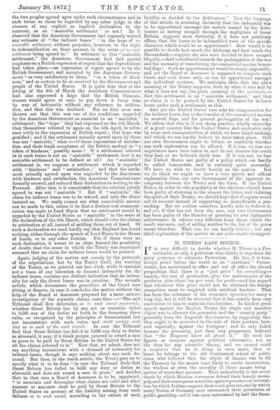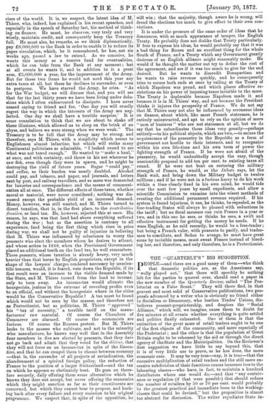M. THIERS' LAST SPEECH.
'.IT is very difficult to decide whether M. Tillers is a Pro- tectionist, or only a politician who thinks it expedient for party purposes to advocate Protection. He has, it is true, always posed before the world as an " obstinate " Protec- tionist, has maintained in office and out of office the absurd proposition that there is a "just price" for everything-- namely, the cost of production, plus the maintenance of the producer, plus about ten per cent. for profit—and has argued that whenever this price could not be obtained the foreign competitor must be weighted with artificial burdens. That has been the substance of his economic speeches for many a long day, but it will be observed that it has usually been very convenient to him to maintain this doctrine. In his first great speech against the English Treaty, his single and manifest object was to alienate the peasantry and the "country party" generally from the Imperial Government, by suggesting that they ought to be protected in the sale of their produce, beet- root especially, against the foreigner ; and he only failed because the peasantry, just then very prosperous, believed that "the Emperor knew all about it." He used his figures as weapons against political adversaries, not as the data for any scientific theory, and we cannot avoid a suspicion that he is doing so once more, that at heart he belangs to the old Continental school of politi- cians, who believed that the object of finance was to fill the Treasury by the means least likely to excite insurrection, the wisdom or even the morality of those means being matter of secondary moment. That undoubtedly is the secret thesis by which Russian statesmen defend their brandy mono- poly and their consequent severities against preachers of teetotal- ism, by which Italians support their cruel grist tax, and by which many States of Germany once extenuated their permission of public gambling, and it was once entertained by half the than- ciers of the world. It is, we suspect, the latent idea of M. Thiers, who, indeed, has explained in his recent speeches, and especially in the speech of Saturday last, his method of think- ing on finance. He must, he observes, very truly and very wisely, maintain credit, and consequently keep the Treasury full. He must also, he remarks, as we think diplomatically, pay £8,000,000 to the Bank in order to enable it to reduce its paper circulation, which, be it remembered, he has, not six weeks ago, passed a law to extend. As we conceive, he wants this money as a reserve fund for eventualities, which he can take from the Bank at any moment ; but at all events he wants it, and in addition to it a great sum, £3,000,000 a year, for the improvement of the Army. But for these two items he would not need this year any extra taxes at all, but these he declines to surrender, or even to postpone. We have starved the Army, he cries. "As for the War budget, we will discuss that, and you will see that for the last thirty years we have been living under delu- sions which I often endeavoured to dissipate. I have never ceased saying to friend and foe, 'One day you will cruelly regret the way in which the interests of the Army are neg- lected. One day we shall have a terrible surprise.' It is some consolation to think that we are about to shake off these illusions, which allowed us to sleep on the brink of an abyss, and believe we were strong when we were weak." The Treasury is to be full that the Army may be strong, and therefore, says M. Thiers, with a simplicity which seems to Englishmen almost infantine, but which will strike many Continental politicians as admirable, "I looked round to see what was not taxed enough." He wanted to "make a haul," at once, and with certainty, and threw in his net wherever he saw fish, even though they were in spawn, and he might be destroying the yield of future years. Sugar "could pay," and coffee, so their burden was nearly doubled. Alcohol could pay, and tobacco, and, paper, and journals, and letters sent by post, and railway travellers, and so more was demanded for luxuries and correspondence and the means of communi- .cation all at once. The different effects of these taxes, whether moral or material, were never considered; nothing was dis- cussed except the probable yield of an increased demand. Money, however, was still wanted, and M. Thiers turned to direct taxation, that is, in the first place, to the contribution fonciere, or land tax. He, however, rejected this at once. His reason, he says, was that land had above everything suffered during the war ; but as the assertion is contrary to all .experience, food being the first thing which rises in price during war, we shall not be guilty of injustice in believing that M. Thiers was influenced by reluctance to worry the peasants who elect the members whom he desires to attract, and whose action in 1848, when the Provisional Government placed an additional tenth on the land tax, he well remembers. These peasants, whose taxation is already heavy, very much heavier than that borne by English proprietors, except in the shape of the lawyers' charges rendered necessary by unscien- tific tenures, would, it is feared, vote down the Republic, if its first result were an increase to the visible demand made by the State, and M. Thiers turned from the land to income, only to turn away. An income-tax would alienate the bourgeoisie, jealous in the extreme of revealing profits even to an official, and without the bourgeoisie where in the cities would be the Conservative Republic ? A tax must be found which would not be seen by the masses, and therefore not as Protectionist, but as politician, M. Thiers " approved " his "tax of necessity," a terrible tariff on the manu- facturers' raw material. Of course the Chambers of Commerce are alarmed. Of course the economists are furious. Of course the Bourses protest. But M. Thiers looks to the masses who cultivate, and not to the minority who manufacture, he knows very well that in the Assembly sour members in five are elected by peasants, that they dare not go back and admit that they voted for the decline, that they will not force on an income-tax in spite of the Execu- tive, and that he can compel them to choose between economy —that is, the surrender of all projects of revindication, the abandonment of a spirited foreign policy, the reduction of France to the position of a larger Switzerland—and the tax on which he appears so obstinately bent. He goes on there- fore securely, daily offering them some alternative which he knows they dare not accept, but never offering the economies which they might sanction as far as their constituents are concerned, but which they cannot bear to propose, and hark- ing back after every failure and every omission to his original programme. We suspect that, in spite of the opposition, he
will win ; that the majority, though aware he is wrong, will dread the elections too much to give effect to their own con- victions.
It is under the pressure of the same order of ideas that he denounces, with so much appearance of temper, the English Treaty. He probably does not dislike that Treaty particularly. If free to express his ideas, he would probably say that it was a bad thing for Rouen and an excellent thing for the whole South of France, and a Treaty which any Government greatly desirous of an English alliance might reasonably make. He would if he thought the matter out try to define the cost of the agreement, and see if it was too much to give for the end desired. But he wants to discredit Bonapartism and he wants to raise revenue quickly, and he consequently tries to secure both ends at once by railing at the Treaty of which Napoleon was proud, and which places effective re- strictions on his power of imposing taxes invisible to the mass. The Treaty is deplorable because Napoleon made it and because it is in M. Thiers' way, and not because the President thinks it injures the prosperity of France. We do not say that M. There may not also be influenced by erroneous ideas on finance, about which, like most French statesmen, he is entirely uninstructed, and apt to rely on the opinion of mere "men of business" who are not statesmen at all, but we do say that he subordinates these ideas very greatly—perhaps entirely—to his political objects, which are two,—to secure the acquiescence of the peasantry in the Republic as a form of government not hostile to their interests, and to reorganize within his own life-time and his own term of power the fighting strength of France. If he were not afraid of the peasantry, he would undoubtedly accept the easy, though unscientific proposal to add ten per cent, to existing taxes all round. If he were not bent on restoring the military strength of France, he would, as the Debate says, let the Bank wait, and bring down the Military budget to twelve millions ; and if he were not in a furious hurry to do his work within a time clearly fixed in his own mind, he would tide over the next few years by small expedients, and allow a scientific Commission to examine into the wisest methods of creating the additional permanent revenue required. If his system is found injurious, it can, he thinks, be repealed, as the free-trading States will always be pleased with reductions in the tariff; but no fiscal measure can ruin France in a year or two, and in this one he sees, or thinks he sees, a swift and effective instrument for getting the money he needs. If he were English, as he said recently, he would be a free-trader; but being a French ruler, with peasants to pacify, and trades- men to conciliate, and Sedan to avenge, he must have great sums by invisible means, must sweat France instead of bleed- ing her, and therefore, and only therefore, he is a Protectionist.



































 Previous page
Previous page